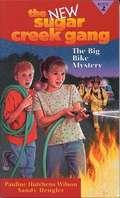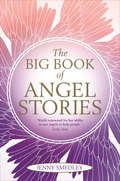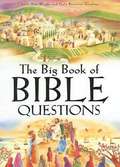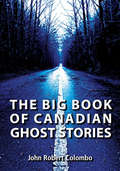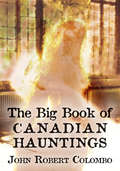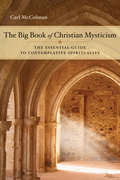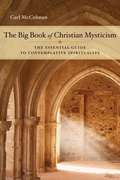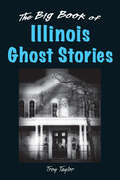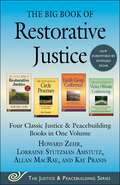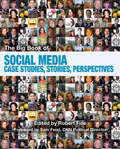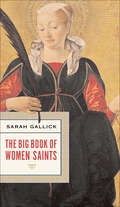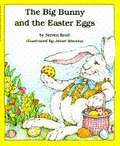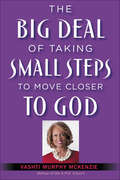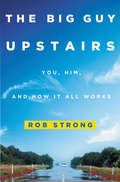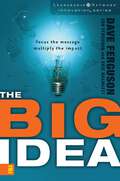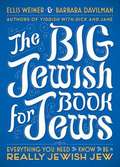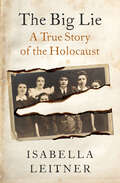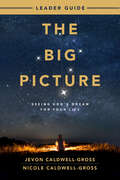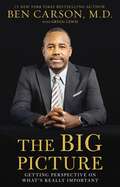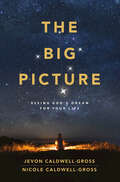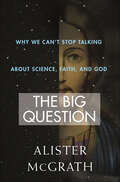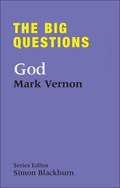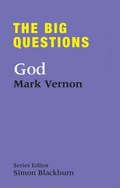- Table View
- List View
The Big Bike Mystery (The New Sugar Creek Gang #2)
by Pauline Hutchens Wilson Sandy DenglerDrawn together by a love for the best-selling Sugar Creek Gang books and a knack for finding trouble, Les, Bits, Tiny, Lynn and Mike form a New Sugar Creek Gang--and find themselves in the middle of a whole new bunch of adventure! Wanted: The Sugar Creek Gang After Les and Bits's church is set on fire, one of the Sugar Creek Gang starts acting awfully suspicious. What could he be hiding? Worst of all, a one-of-a-kind bike places the Sugar Creeker at the scene of the crime! Now it's up to the new Sugar Creek Gang to find a way to stand by their friend--and to solve the mystery before it's too late.
The Big Book of Angel Stories
by Jenny SmedleyIs there such a thing as a miracle? Have you ever seen a ‘sign’ that was too personal to be a coincidence? Do you believe in angels but wonder why some of your prayers go unanswered?In this book, much-loved angel author Jenny Smedley brings together a collection of her most moving and powerful stories about the angels. Filled with astonishing personal accounts from her readers and fans who have seen, heard or been helped by angels, this book will convince even sceptics of the presence of angels in our lives.Inside the pages of this book you will read incredible stories of: •Angels disguised as humans •Angels appearing in dreams to give messages •Angels physically intervening to save a person from an accident or an attack •Angels sending signs in answer to questions or prayersThe astounding stories in this book will renew anyone’s faith in angels and show that they really are all around us. We are guided and protected, and never alone.
The Big Book of Bible Questions
by A D Publishing Services LimitedFour simple questions are asked for each of sixty different Bible persons or events. These simple questions, drawn from the lives of all the main characters of the Bible, and covering all the main events, will delight, challenge, and amuse. All the best-loved stories are here, brought to life by the Italian artist Paola Bertolini Grudina's lively illustrations.
The Big Book of Canadian Ghost Stories
by John Robert ColomboHere are Canada’s haunted houses, ghosts and poltergeists, weird visions of the past and improbable visions of the future, and assurances that there is life after death. included are more than 175 accounts of such events and experiences told mainly by the witnesses themselves — Canadians from all walks of life and all parts of the country. Some of the stories are classics. Others are little known. About one-third of the accounts have never before appeared in print. This fascinating, scary book brings together the most notable stories from the archives of John Robert Columbo, Canada’s "Mr. Mystery," who is known for his many paranormal collections, including Ghost Stories of Canada, Haunted Toronto, Ghost Stories of Ontario, and Strange But True. Whatever your views are about the supernatural and the paranormal — skeptic, believer, middle-of-the-road — this huge collection of stories filled with thrills and chills will cause you to wonder about the n ature of human life and the afterlife.
The Big Book of Canadian Hauntings
by John Robert ColomboWatch out! Here comes another mammoth book to thrill you and chill you and to frighten you to within an inch of your life! It comes bumping out of the night … from John Robert Colombo, the master of the macabre! This new compendium delivers excitement and delight to everyone who finds the unknown and the inexplicable fascinating, baffling, and frightening. The Big Book of Canadian Hauntings offers readers true, first-person accounts of the appearances (and the disappearances!) of ghosts and spirits as well as considerations and discussions of their effects on observers. Some told-as-true tales are reprinted from newspapers and periodicals of the past, but the majority of the stories, which come from every region in Canada, are based on eyewitness reports of the present that are appearing here for the first time and are based on the compiler’s ongoing research. So whether you believe in ghosts, spirits, spooks, spectres, or poltergeists, or not, after reading these narratives contributed by Canadians from all walks of life, you definitely won’t be indifferent to them.
The Big Book of Christian Mysticism: The Essential Guide to Contemplative Spirituality
by Carl McColmanIn popular usage, "mysticism" typically refers to New Age or Eastern forms of spirituality. However, the mystical tradition is also an important component of the Christian tradition. At its heart--and much like its expression in other faith traditions--Christian mysticism is an ancient practice that incorporates meditation, contemplation, worship, philosophy, the quest for personal enlightenment, and the experience of Divine presence. <P><P>This volume is a comprehensive introduction and guide to Christian mysticism. It is a big book about a big possibility: the hope of achieving real, blissful, experiential unison with God. Among the topics covered here are a general introduction to mysticism, the Bible and mysticism, the history and types of Christian mysticism, biographical sketches of leading Christian mystics, and practical instructions about practicing mysticism today. <P><P>This is a breathtaking work that explores a form of spirituality that has changed lives over the course of 2,000 years. Learning about Christian mysticism and how it has been articulated through the centuries will prove inspirational for today's seekers, regardless of the faith tradition. "The mystic is not a special kind of person; every person is a special kind of mytic." --William McNamara
The Big Book of Christian Mysticism: The Essential Guide to Contemplative Spirituality
by Carl MccolmanMany associate mysticism with eastern spiritual practices such as Zen Buddhism or yoga. But Christianity has its own mystical tradition with a long and rich history that reaches back to the New Testament-and remains surprisingly relevant today. The Big Book of Christian Mysticism explores this rich tradition and shows how it can be a powerful tool for transformation and the experience of the Divine.
The Big Book of Illinois Ghost Stories (Big Book of Ghost Stories)
by Troy TaylorMore than 100 stories from haunted locales across the Prairie State. Compiled by Illinois's best-known author on the paranormal, Troy Taylor.
The Big Book of Restorative Justice: Four Classic Justice & Peacebuilding Books in One Volume (Justice and Peacebuilding)
by Howard Zehr Kay Pranis Lorraine Stutzman Amstutz Allan MacRaeThe four most popular restorative justice books in the Justice & Peacebuilding series—The Little Book of Restorative Justice: Revised and Updated, The Little Book of Victim Offender Conferencing, The Little Book of Family Group Conferences, and The Little Book of Circle Processes—in one affordable volume. And now with a new foreword from Howard Zehr, one of the founders of restorative justice!Restorative justice, with its emphasis on identifying the justice needs of everyone involved in a crime, is a worldwide movement of growing influence that is helping victims and communities heal while holding criminals accountable for their actions. This is not a soft-on-crime, feel-good philosophy, but rather a concrete effort to bring justice and healing to everyone involved in a crime. Circle processes draw from the Native American tradition of gathering in a circle to solve problems as a community. Peacemaking circles are used in neighborhoods, in schools, in the workplace, and in social services to support victims of all kinds, resolve behavior problems, and create positive climates.Each book is written by a scholar at the forefront of these movements, making this important reading for classrooms, community leaders, and anyone involved with conflict resolution.
The Big Book of Social Media: Case Studies, Stories, and Perspectives
by Robert FineLearn how social media is affecting change around the world. Get immersed with the real-life drama of Mad Men characters on Twitter. See how nonprofit organizations are spreading their message and growing their organizational base. Gain practical advice from leaders behind brand names like Olympus, CBC Radio, Network Solutions, Center for American Progress, and The Heritage Foundation.
The Big Book of Wild Cats: Fun Animal Facts for Kids
by Rachael SmithExplore the wonderful world of wild cats—an encyclopedia for kids ages 7 to 10Did you know that wild cats can be found on every continent except Antarctica? That's right—there's a whole world of wild cats to discover in this standout among animal facts books for kids! The Big Book of Wild Cats is packed with life-like illustrations, colorful photos, and fascinating facts about wild cats.Everything animal facts books for kids should be, this book has in-depth information about all 37 species of wild cats. Discover details about each one's appearance, habitat, social structure, hunting habits, and how they raise their young. Whether you're writing a school report or just want to learn about wild cats, you'll have a roaring good time with The Big Book of Wild Cats.All animal facts books for kids should include:Cats by continent—Unlike other animal facts books for kids, this one has illustrated maps showing which wild cats live on each continent around the globe.Endangered cats—Find out ways you can do your part to help endangered wild cats like tigers and snow leopards.Helpful definitions—Discover an easy-to-understand glossary for some of the more advanced words in this exciting choice among animal facts books for kids.Bring the excitement of wild cats into your own home (safely!) with facts and pictures you won't find in other animal facts books for kids. The Big Book of Wild Cats has it all!
The Big Book of Women Saints
by Sarah Gallick“A fascinating collection that profiles more than 400 inspiring Catholic women.” —Library JournalMost books about the saints are thin on women, especially contemporary women. Even Fr. Alban Butler’s popular Lives of the Saints lists far more men than women. No book about the saints could ignore such beloved early martyrs as Agnes of Rome and Lucy of Syracuse, but this new book will introduce you to many new women who have been canonized or beatified in recent decades. Among them are martyrs and mystics, rebellious daughters, loving wives and mothers, reformed prostitutes, restless visionaries, and humble recluses. Of the hundreds of women mentioned, 159 have been canonized or beatified since 1979. Approximately 100 of them lived in the twentieth century.This book is also unique in that it uses the saint's own words wherever possible, taking advantage of newly discovered archives, memoirs, and other primary sources. It includes resources such as internet shrines and other websites, as well as little-known information on the canonization process.“A beautiful and concise guide to the luminous women who inspire us to deeper faith.” —Edward L. Beck, author of God Underneath: Spiritual Memoirs of a Catholic Priest
The Big Bunny and the Easter Eggs
by Steven Kroll Janet StevensWilbur is busy getting everything ready for Easter. He made new baskets, painted the eggs, and made lots of candy. Everything was all set to go, until Easter Eve, Wilbur gets sick. His friends try to help him but it is too big of a job for them. Can they save Easter, or won't there be one this year?
The Big Deal of Taking Small Steps to Move Closer to God
by Vashti McKenzieTHE BIG DEAL... shows how to develop a stronger relationship with God and more effective spiritual lifestyle by taking small steps that lead to big changes. Been running for Jesus a long time (I'm not tired yet) Been singing for Jesus a long time (I'm not tired yet) Been running by day and praying by night (I'm not tired yet) I've gotta get going, it's a mighty hard fight (No...I'm not tired yet) I've been serving God a long time (I'm not tired yet) I've been living for God a long time (I'm not tired yet) I've been praying to the Lord a long time (I'm not tired yet) It's an uphill journey but all I've got to say is (I'm not tired yet) The old spiritual song lifts you, but you are tired. Or maybe you're bored. You're still going to church. You're still praying. You're still serving. You're still giving. Deep within you, faith remains. But you feel a longing. You're not seeking fireworks. You're not a pew-sitter, safe in some spiritual comfort zone, looking for a thrill from the Lord. Your trust in God is secure. But you feel a longing for something more, deeper, fresher. If you've ignored these innermost feelings thinking they're no big deal, this basic yet dynamic program that Bishop Vashti McKenzie has implemented in more than two hundred churches with astounding results is for you. Individuals who have had many years of Christian life discovered a renewed sense of calling and purpose. Even new believers were invigorated in their faith-building process. Bishop McKenzie prescribes very small changes-such as adding a mere thirty seconds of prayer daily-that lead to radical closeness to God. And building an enjoyable, meaningful relationship with the Almighty doesn't mean striving for perfection. Small steps-but meaningful steps-collectively evolve into intimacy with God. And the big deal result is greater ability to biblically address life challenges. The big deal is that you're even more available to serve family, church, and community: truly in "no ways tired." Increasing spirituality is incremental, not monumental. Mustard-seed-like increases in positive actions (and corresponding decreases in negative ones) yield mountain-moving growth!
The Big Fisherman
by Lloyd C. DouglasThe dramatic fictionalized story of Simon Peter, from his first meeting with Christ, to his conversion and on through to Peter's death by crucifixion, set on the shores of Galilee, the crossroads of the world--a polyglot world of quarreling, scheming people, warring then as it is today. The author of The Robe takes us on a journey to discover the intertwined stories of Simon, the Big Fisherman, two-fisted and profane, who lays down his nets in a momentous act of faith; young princess Fara, half Judean and half Arabian, bent on an errand of vengeance to assassinate her Jewish father, Antipas, Tetrarch of Galilee; and Voldi, the young Arabian prince who takes up her vendetta when Fara is purged by an encounter with Jesus of her hate.
The Big Guy Upstairs: You, Him, and How It All Works
by Rob StrongWhen Rob Strong tells people he's a pastor in Massachusetts--"the least churched state in the USA"--it sometimes stops them in their tracks, but Strong never lets his faith bar him from doing what matters most: building sincere relationships with people as, together, they question and explore the nature of The Big Guy Upstairs. Here he shares how approachable, interactive, and, above all, relevant God can be in readers' lives, without any of the trappings of religion or "Christianese" that make many of them suspicious. Filled with his inimitable brand of wit and humor, Strong offers readers a fresh take on the importance of understanding their own humanity and their purpose in life, how to disagree with but still respect the perspectives of others, and the role that God plays in every single facet of their lives--especially when they least expect it. From a "weed" that turned into a delicious peach tree to a miraculous pair of brown shoes, Strong will engage readers with insightful stories and biblical commentary that reveal why their lives are significant--and how God is more intentional, active, and closer than they realize.
The Big Idea: Focus the Message---Multiply the Impact (Leadership Network Innovation Series)
by Dave Ferguson Jon Ferguson Eric BramlettNothing is more dangerous than a single compelling idea that is lived out and nothing is more harmless than lots of little ideas never applied. By creatively communicating one Big Idea every week your church will transform people into genuine Christ followers who live out the mission of Jesus. Less is more!
The Big Jewish Book for Jews
by Ellis Barbara Weiner DavilmanA hilarious compendium of traditional wisdom, recipes, and lore from the authors of the bestselling Yiddish with Dick and Jane. Modern Jews have forgotten cherished traditions and become, sadly, all- too assimilated. It's enough to make you meshugeneh. Today's Jews need to relearn the old ways so that cultural identity means something other than laughing knowingly at Curb Your Enthusiasm- and The Big Jewish Book for Jews is here to help. This wise and wise-cracking fully-illustrated book offers invaluable instruction on everything from how to sacrifice a lamb unto the lord to the rules of Mahjong. Jews of all ages and backgrounds will welcome the opportunity to be the Jewiest Jew of all, and reconnect to ancestors going all the way back to Moses and a time when God was the only GPS a Jew needed. Watch a Video
The Big Lie: A True Story
by Isabella LeitnerThe Pulitzer Prize–nominated author recounts her Holocaust experience—her imprisonment at Auschwitz and her dramatic escape—in this book for young readers. As World War II rages in Europe, the fighting seems far away from Isabella Leitner and her family. Only rumors of Nazi horrors have reached them, and they feel safe in the small Hungarian town of Kisvarda. That is, until March 20, 1944 . . . Overnight, Isabella&’s whole world changes. Suddenly, she must wear a yellow star, be inside by curfew, and cannot go back to school. And that&’s only the beginning. Her family is rounded up by Nazi soldiers. They are put in cattle cars and taken to Auschwitz, a death camp in Poland. Only Isabella and three of her sisters are kept together, the rest of their family is forced to separate parts of the camp. Together, the four girls face their worst fears—until they get a chance at freedom. The Big Lie offers a look at history through the eyes of a woman whose strength and hope helped her overcome the worst of human nature. Leitner&’s &“approach allows readers to appreciate the young Isabella&’s incomprehension of the Final Solution even as she generates a coherent and compelling narrative&” (Publishers Weekly).
The Big Picture Leader Guide: Seeing God's Dream for Your Life
by Jevon Caldwell-Gross Nicole Caldwell-GrossConnect the dots of triumph and trauma in your life to discover God’s presence by studying the story of Joseph in Genesis.Life can often feel like a scattering of random events. The various choices, opportunities, or even pain we experience seem to have no real purpose or connection. But if we pay attention to God’s work, our lives tell a different story.The story of Joseph in Genesis teaches us to look for the big picture in our lives. It shows us how God weaves together events that seem random into a beautiful image of joy, survival, purpose, and meaning. In The Big Picture: Seeing God’s Dream for Your Life, authors Jevon and Nicole Caldwell-Gross take a closer look at the life of Joseph to discover God’s presence in moments of triumph and trauma. Join them for this five-week study and see God’s dream for your life as you begin connecting the dots of God’s grace, presence, and protection.The Leader Guide contains everything needed to guide a group through the five-week study including session plans, activities, and discussion questions, as well as multiple format options.
The Big Picture: Getting Perspective on What's Really Important in Life
by Ben Carson Gregg LewisIn his grade school days, Ben Carson would hardly have been voted “most likely to become a famous surgeon.” His classmates had already given him another label: class dummy. Then a light clicked on for Ben—and a consuming passion for learning that catapulted him from “zero” test grades to a Yale scholarship, a pioneering role in modern medicine, and an influence that has extended from inner-city schools to corporate boardrooms and Washington corridors of power. What made the difference? Belief in his own potential, a commitment to education and making the most of his opportunities to learn, determination to make the world a better place, and faith in a God who knows no limits. Seeing the Big Picture. In The Big Picture, Ben Carson reveals the spiritual and philosophical foundations that undergird not just his dramatic career, but his approach to all of life. As in his best-selling Gifted Hands Dr. Carson shares colorful behind-the-scenes anecdotes. As in Think Big, he describes his practical principles for success. But The Big Picture is more than an autobiography or a personal-effectiveness manual. Rather, it’s a multifaceted look at the faith and vision that can see us all through hardship and failure, and stir us to bold exploits on behalf of something greater than ourselves. Dr. Carson begins by describing how he cultivated a Big-Picture perspective in his own life. Then he discusses ways to which all of us can approach parenting, family, business and friendships with the Big Picture in mind. Finally he looks at some pressing social issues—in particular, racial diversity, health care, and education—and considers how we ought to view them and what we should do about them in light of the Big Picture. Drawing on a vast array of experiences in roles ranging from trailblazing surgeon to public speaker, to husband and family man, Ben Carson shows how we can turn the course of our lives, out communities, our country, and our world by keeping the Big Picture always in mind.
The Big Picture: Seeing God's Dream for Your Life
by Jevon Caldwell-Gross Nicole Caldwell-GrossConnect the dots of triumph and trauma in your life to discover God’s presence by studying the story of Joseph in Genesis.Life can often feel like a scattering of random events. The various choices, opportunities, or even pain we experience seem to have no real purpose or connection. But if we pay attention to God’s work, our lives tell a different story.The story of Joseph in Genesis teaches us to look for the big picture in our lives. It shows us how God weaves together events that seem random into a beautiful image of joy, survival, purpose, and meaning. In The Big Picture: Seeing God’s Dream for Your Life, authors Jevon and Nicole Caldwell-Gross take a closer look at the life of Joseph to discover God’s presence in moments of triumph and trauma. Join them for this five-week study and see God’s dream for your life as you begin connecting the dots of God’s grace, presence, and protection.Components for the five-week study include a book, comprehensive Leader Guide, DVD/Video sessions.
The Big Question: Why We Can’t Stop Talking About Science, Faith and God
by Alister McGrathRichard Dawkins's groundbreaking book The God Delusion created an explosion of interest in the relation of science and faith. This often troubled relationship between science and religion was seemingly damaged by the rise of the New Atheism, which insisted that science had essentially disproved not just God but also the value of religion. There is increasing skepticism towards its often glib and superficial answers; and the big questions about faith, God and science haven't gone away--in fact, we seem to talk about them more than ever. Alister McGrath's The Big Question is an accessible, engaging account of how science relates to faith, exploring how the working methods and assumptions of the natural sciences can be theologically useful. McGrath uses stories and analogies, as well as personal accounts, in order to help readers understand the scientific and theological points he makes, and grasp their deeper significance. An extremely accomplished scientist and scholar, McGrath criticizes the evangelism of the New Atheists and paves a logical well-argued road to the compatibility between science and faith.Some of his main discussion points include:1. There is much more convergence between science and faith than is usually appreciated2. How the three great models of scientific explanation can be adapted to religious belief3. Belief in God provides a 'big picture' of reality, making sense of science's successes
The Big Questions: God
by Mark VernonEasy, enlightening and mind-stretching, here are answers to the 20 biggest questions of religion and its attempts to give meaning to our world.The Big Questions series is designed to let renowned experts address the 20 most fundamental and frequently asked questions of a major branch of science or philosophy. Each 3000-word essay simply and concisely examines a question that has eternally perplexed enquiring minds, and provides answers based on the latest research. This ambitious project is a unique distillation of humanity's best ideas. In The Big Questions: God, Mark Vernon answers the 20 key questions:Can reason prove the existence of God? Will science bring the end of religion? Why do people still have religious beliefs? Is religion a mistake of evolution? Can drugs induce religious experiences? Can you be spiritual without being religious? Have you seen a miracle? What is the literal meaning of Scripture? If you're not religious, is nothing sacred? Can an agnostic pray? Is religion inherently violent? What is it like to be a fundamentalist? What is Buddhist enlightenment? Is Confucianism a religion? Is nature divine? Is there a perennial philosophy? Does human suffering rule out God? Can we be good without God? Are we living in the end times? Is there life after death?
The Big Questions: God
by Mark VernonCan the existence of God be proved by reason alone? Has scientific discovery destroyed the intellectual basis for religion? Does the presence of evil in the world mean that God does not care about us? And why does fundamentalism flourish in an age of progress? In Big Questions: God, Mark Vernon addresses these and many more perennial dilemmas, drawing on physics and philosophy, spiritual traditions and religious experience. He explores the place of religion in relation to science, in making sense of evil, in understanding history and in explaining value. Asking the big questions again for himself, he finds new areas of thought and perception. Big Questions: God is a subtle but compelling argument for the necessity of a spiritual dimension in modern society and offers profound insights on humanity's constant battle to make sense of the transcendent.
